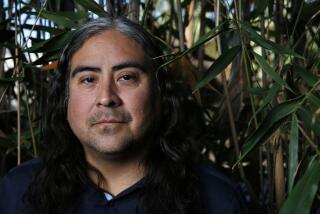MUSIC REVIEW : Serkin Delivers Aloof Artistry
Peter Serkin looks something like a leaner Garrison Keillor and shares with the bard of Wobegon a deceptive matter-of-factness, masking sophisticated depths of thought and expression.
Don’t imagine, however, that there were many laughs or much playing to the fans at the pianist’s recital Tuesday. Serkin brought an almost repressive collection of introspective miniatures to the Dorothy Chandler Pavilion, which he dispatched with an artistic efficiency that seemed indifferent to his audience--unperturbed by coughing and electronic squeals.
In this context, the big piece was Mozart’s Sonata in F, K. 533--big in intellectual force, that is, and far-sighted in musical means, but also austerely formal and bearing the most aloof of rondos. Serkin’s playing certainly took it on those terms, formidably precise and clear, and beautifully sculpted, but with even the most tender nuances sounding calculated.
Beethoven’s Opus 126 Bagatelles proved nearly perfect vehicles for Serkin’s immaculately controlled fantasy. He projected all the passion, the lyric flights and the paradoxically stern whimsy with a sense of predestination.
Serkin included three works from the program of commissioned miniatures he played on his last recital visit here, at Royce Hall little over a year ago. Alexander Goehr’s intricate “ . . . in real time” provided the busiest work.
The pianist opened with his transcriptions of three of Brahms’ Opus 122 Chorale Preludes. He managed to give each a feeling of individual and varied registration but in a completely pianistic style, while keeping the tunes distinct and the emotions poignantly restrained.
At the end came the fireworks, in the form of Chopin’s Opus 19 Bolero. Serkin supplied it with almost orchestral color and weight, free in rhythmic inflection and immensely vital.
This proved merely the beginning of a Chopin set, completed in encore--almost despite the applause and the rush for the exits--with the Etude, Opus 25, No. 2; Mazurka in C, Opus 56, No. 2, and the Etude, Opus 25, No. 9. Serkin hurdled all challenges, at risky speeds, with nonchalant bravura and poetry no less moving for the motion.
More to Read
The biggest entertainment stories
Get our big stories about Hollywood, film, television, music, arts, culture and more right in your inbox as soon as they publish.
You may occasionally receive promotional content from the Los Angeles Times.










